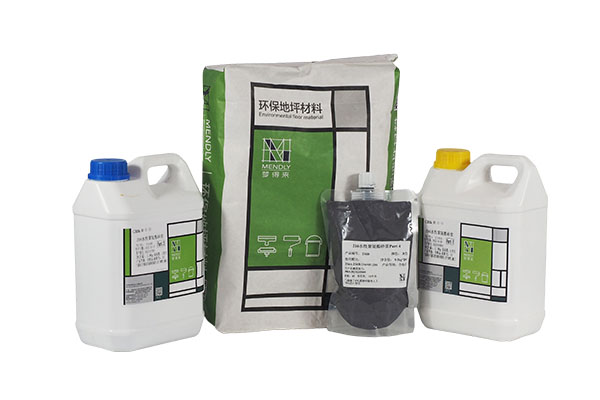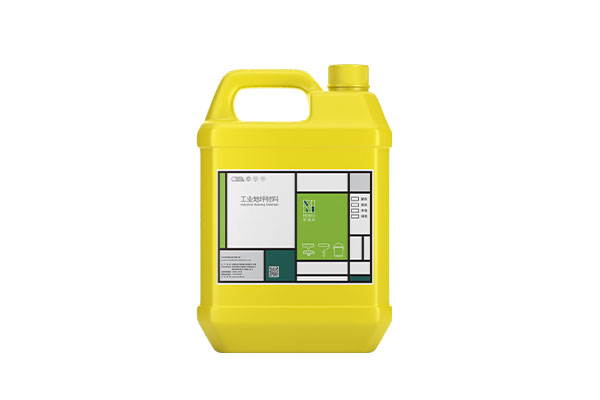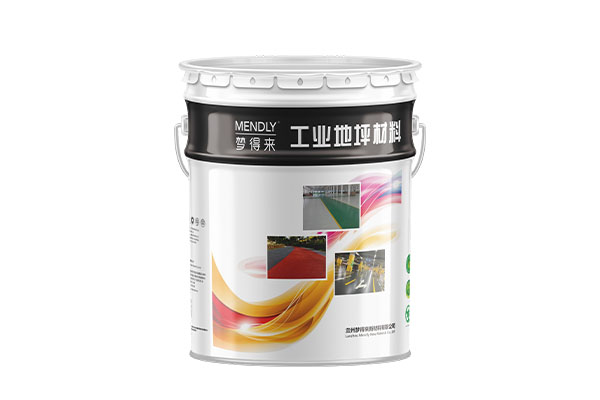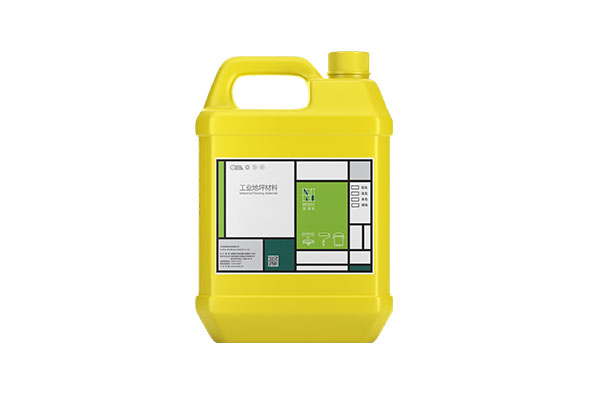How does waterborne polyurethane mortar reshape the super strong protection of industrial floor?
Release Time : 2024-12-24
Waterborne polyurethane mortar is a high-performance floor material, widely used in the industrial field, especially in occasions that require super strong protection.
1. Material characteristics
Waterborne environmental protection: waterborne polyurethane mortar uses water as the dispersion medium, does not contain organic solvents, is environmentally friendly and non-toxic, and does not emit volatile organic compounds (VOC) during construction, which meets environmental protection requirements.
High chemical resistance: waterborne polyurethane mortar has excellent chemical corrosion resistance and can resist the erosion of various acids, alkalis, solvents and other chemicals. It is suitable for chemical storage and processing areas.
High wear resistance: polyurethane mortar has high hardness and wear resistance, can withstand heavy loads and frequent friction, and extend the service life of the floor.
High impact resistance: polyurethane mortar has excellent impact resistance, which can keep the surface flat and reduce damage when subjected to heavy impact and mechanical impact.
High bonding strength: The polyurethane mortar has strong bonding strength with the substrate and can be firmly attached to the surface of concrete, metal and other substrates to prevent delamination and blistering.
2. Application advantages
Chemical corrosion resistance: Industrial floors often need to resist the erosion of various chemicals. The chemical resistance of waterborne polyurethane mortar can ensure that the floor is not corroded during long-term use and maintain the integrity and stability of the surface.
Wear and pressure resistance: In high-flow, heavy-load industrial environments, the high wear resistance and pressure resistance of waterborne polyurethane mortar can effectively reduce the wear and damage of the floor and extend its service life.
Impact resistance: In logistics, warehousing and other places, the floor often needs to withstand the impact of falling objects and mechanical equipment. The high impact resistance of waterborne polyurethane mortar can protect the floor from damage.
Anti-slip performance: Waterborne polyurethane mortar can be added with anti-slip particles or made into anti-slip textures to improve the anti-slip performance of the floor and reduce the occurrence of slip accidents.
3. Construction process
Substrate treatment: Clean the substrate, remove oil, dust and loose materials, and ensure that the substrate surface is clean and flat. For concrete substrates, grinding and repairing are required to ensure the flatness and strength of the substrate.
Primer treatment: Apply special primer materials to enhance the bonding strength between polyurethane mortar and substrate and improve overall durability.
Mortar paving: Apply waterborne polyurethane mortar evenly on the substrate after primer treatment, and adjust the thickness of mortar as needed to ensure uniform thickness.
Surface treatment: Surface treatment can be performed as needed, such as adding anti-slip particles, rolling or troweling, to achieve the required performance requirements.
Maintenance: After construction is completed, proper maintenance is required to keep the construction area clean and dry to avoid external interference during the maintenance period.
4. Maintenance
Regular cleaning: Clean regularly with detergent and water to keep the floor surface clean and tidy to prevent the accumulation of dust and dirt.
Avoid chemical pollution: Avoid pouring strong acids, alkalis and other chemicals directly on the floor, and take appropriate protective measures when using it.
Avoid heavy impact: During use, avoid heavy objects directly impacting the floor, especially on vulnerable parts such as edges and corners.
Repair damage: If damage is found on the floor surface, it should be repaired in time to prevent the damage from expanding.
5. Application Cases
Chemical plant: In the floor application of chemical plants, waterborne polyurethane mortar can effectively resist the erosion of various chemicals and protect the ground from damage.
Food processing plant: In food processing plants, the non-toxic and environmentally friendly characteristics of waterborne polyurethane mortar meet food safety requirements, and at the same time have good wear resistance and anti-slip properties to ensure the safety and hygiene of the production environment.
Logistics warehouse: In logistics warehouses, the high wear resistance and impact resistance of waterborne polyurethane mortar can withstand heavy loads and frequent transportation activities, extending the service life of the floor.
Pharmaceutical factories: In pharmaceutical factories, the high cleanliness and chemical resistance of waterborne polyurethane mortar can meet the strict requirements of pharmaceutical production and ensure the quality and safety of products.
Waterborne polyurethane mortar can provide super strong protection in industrial flooring through its excellent material properties, construction process and maintenance measures. Its chemical resistance, high wear resistance, high impact resistance and anti-slip properties make waterborne polyurethane mortar an ideal choice for industrial flooring, effectively protecting the floor from damage, extending the service life of the floor, and improving the safety and efficiency of the production environment.
1. Material characteristics
Waterborne environmental protection: waterborne polyurethane mortar uses water as the dispersion medium, does not contain organic solvents, is environmentally friendly and non-toxic, and does not emit volatile organic compounds (VOC) during construction, which meets environmental protection requirements.
High chemical resistance: waterborne polyurethane mortar has excellent chemical corrosion resistance and can resist the erosion of various acids, alkalis, solvents and other chemicals. It is suitable for chemical storage and processing areas.
High wear resistance: polyurethane mortar has high hardness and wear resistance, can withstand heavy loads and frequent friction, and extend the service life of the floor.
High impact resistance: polyurethane mortar has excellent impact resistance, which can keep the surface flat and reduce damage when subjected to heavy impact and mechanical impact.
High bonding strength: The polyurethane mortar has strong bonding strength with the substrate and can be firmly attached to the surface of concrete, metal and other substrates to prevent delamination and blistering.
2. Application advantages
Chemical corrosion resistance: Industrial floors often need to resist the erosion of various chemicals. The chemical resistance of waterborne polyurethane mortar can ensure that the floor is not corroded during long-term use and maintain the integrity and stability of the surface.
Wear and pressure resistance: In high-flow, heavy-load industrial environments, the high wear resistance and pressure resistance of waterborne polyurethane mortar can effectively reduce the wear and damage of the floor and extend its service life.
Impact resistance: In logistics, warehousing and other places, the floor often needs to withstand the impact of falling objects and mechanical equipment. The high impact resistance of waterborne polyurethane mortar can protect the floor from damage.
Anti-slip performance: Waterborne polyurethane mortar can be added with anti-slip particles or made into anti-slip textures to improve the anti-slip performance of the floor and reduce the occurrence of slip accidents.
3. Construction process
Substrate treatment: Clean the substrate, remove oil, dust and loose materials, and ensure that the substrate surface is clean and flat. For concrete substrates, grinding and repairing are required to ensure the flatness and strength of the substrate.
Primer treatment: Apply special primer materials to enhance the bonding strength between polyurethane mortar and substrate and improve overall durability.
Mortar paving: Apply waterborne polyurethane mortar evenly on the substrate after primer treatment, and adjust the thickness of mortar as needed to ensure uniform thickness.
Surface treatment: Surface treatment can be performed as needed, such as adding anti-slip particles, rolling or troweling, to achieve the required performance requirements.
Maintenance: After construction is completed, proper maintenance is required to keep the construction area clean and dry to avoid external interference during the maintenance period.
4. Maintenance
Regular cleaning: Clean regularly with detergent and water to keep the floor surface clean and tidy to prevent the accumulation of dust and dirt.
Avoid chemical pollution: Avoid pouring strong acids, alkalis and other chemicals directly on the floor, and take appropriate protective measures when using it.
Avoid heavy impact: During use, avoid heavy objects directly impacting the floor, especially on vulnerable parts such as edges and corners.
Repair damage: If damage is found on the floor surface, it should be repaired in time to prevent the damage from expanding.
5. Application Cases
Chemical plant: In the floor application of chemical plants, waterborne polyurethane mortar can effectively resist the erosion of various chemicals and protect the ground from damage.
Food processing plant: In food processing plants, the non-toxic and environmentally friendly characteristics of waterborne polyurethane mortar meet food safety requirements, and at the same time have good wear resistance and anti-slip properties to ensure the safety and hygiene of the production environment.
Logistics warehouse: In logistics warehouses, the high wear resistance and impact resistance of waterborne polyurethane mortar can withstand heavy loads and frequent transportation activities, extending the service life of the floor.
Pharmaceutical factories: In pharmaceutical factories, the high cleanliness and chemical resistance of waterborne polyurethane mortar can meet the strict requirements of pharmaceutical production and ensure the quality and safety of products.
Waterborne polyurethane mortar can provide super strong protection in industrial flooring through its excellent material properties, construction process and maintenance measures. Its chemical resistance, high wear resistance, high impact resistance and anti-slip properties make waterborne polyurethane mortar an ideal choice for industrial flooring, effectively protecting the floor from damage, extending the service life of the floor, and improving the safety and efficiency of the production environment.







